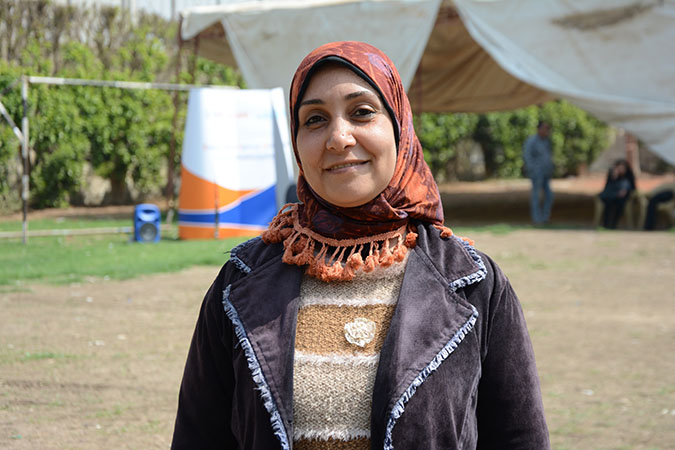From where I stand: “I feel like I am creating great change”
Date:

Magda Ahmed is a rural woman leader from the governorate of Minya in Upper Egypt. Growing up, she had always loved school, and was very eager to continue education after receiving her high school diploma. However, she was not given the opportunity to make this crucial decision herself, and against her wishes her parents and brothers decided that she would not continue her education after high school. While this was only one of the many challenges that she faced as a young woman, she did not let it stop her getting to an influential role in her community. Today, as a rural woman leader, Magda is working hard to raise the awareness of her community on issues related to the prevention of all forms of violence against women and girls, and to change negative behaviors that discriminate against women and girls.
“It is difficult for a girl to continue her education in Upper Egypt. I finished my [high school] diploma but could not take my education any further as my parents decided that a diploma is enough. My brothers also did not support the idea of educating the girls of the family. I tried to convince them but I failed. Before my mother died, even though she was uneducated, she encouraged me to learn new skills like embroidery, drawing, reading and to write short stories.
When I got married I wanted to devote my energy to work but my husband kept saying that my house and children are my job. With the support of my mother-in-law, he finally agreed. I started by working at a nursery for 3 years, and I enjoyed it very much. I always wanted to be a role model for my children, so I applied to a competition initiated by the Ministry of Social Solidarity that was hiring social workers. After being tested in various subjects such as geography, literature, and math - which I prepared for through reading - to my surprise I was accepted.
It was my first time to do fieldwork. My job was to go on home visits writing up reports on the families and noting their complaints. [After a number of visits], women started trusting me and shared their personal stories on topics such as domestic violence, child marriage and female genital cutting/mutilation (FGC/M). Through the [‘Eliminating Violence against Women and Girls Programme’], I was trained to raise awareness on the negative consequences of these practices for women and girls and to advise them on [family matters,] and on the detriments of FGM [on both the woman and her newborns’ health]. I personally got married by the age of 18 and I know that I was not ready at all. Giving birth to a baby gave me much happiness, but I didn’t fully understand the range of responsibilities I had as a mother. My experiences of marrying young helped me to enlighten the women I visited about the issues of early marriage.
One of my greatest achievements was when I managed to convince a mother at the last minute to change her mind about conducting FGC/M on her daughter. She left me with a promise that no one will ever convince her to harm her girl in such a manner. I now recognize that my role as a rural woman leader is crucial in the community. I go to the field with a smile and feeling positive. When I go for these visits I feel like I am creating great change.”
Magda is a mother of four and a rural women leader in Eliminating Violence Against Women and Girls Programme, funded by USAID and implemented by UN Women in partnership with the National Council for Women, the Ministry of Social Solidarity, and CARE International in Egypt. Her work is related to Sustainable Development Goal 5, which aims to eliminate all harmful practices, end all forms of violence against women and girls and ensure equal opportunities for leadership.